A Guide to the Game-Changing Childcare Funding Initiatives Announced in the Chancellor’s Spring Budget 2023
Generous and far-reaching childcare funding reforms were announced in the Spring Budget 2023 last month. The Chancellor of the Exchequer’s new funding plans should give more parents, including those of even younger children, access to significant help with childcare costs going forwards. The new initiatives will:
- allow
 parents to return to the workplace sooner after the birth of their child if they so choose;
parents to return to the workplace sooner after the birth of their child if they so choose; - help fill vacant jobs in the workplace;
- allow parents (particularly women) to progress their careers sooner after starting a family;
- help to boost the UK economy, and;
- perhaps most importantly give more children access to a good early years education, starting potentially at a younger age. Beginning no later than the age of 2 has been shown to better prepare children for the transition to school, boost children’s education overall, improve GCSE grades, improve career prospects and even increase earning potential once they reach adulthood. Learn more about the benefits of a good early years education here.
So, the new childcare funding should make a huge difference for those families that are eligible. Let’s take a look at the 3 key childcare funding initiatives announced…
Significant New Childcare Funding for Children Aged 9 to 36 Months
Many parents will already be aware of the existing, free, Government-funded childcare hours available to all 3 and 4-year-olds in England (plus some disadvantaged 2-year-olds). Well, in the biggest news from the Spring Budget, free childcare funding will soon extend to much younger children, aged from just 9 months of age if they suit eligibility requirements. Here’s how the free childcare will be rolled out:
- From April 2024,
 children aged 2 from eligible working families will be able to claim 570 hours of free childcare each year. This is typically taken as 15 hours of free childcare each week over 38 weeks, although exactly how it’s taken may be agreed otherwise between the family and the childcare provider.
children aged 2 from eligible working families will be able to claim 570 hours of free childcare each year. This is typically taken as 15 hours of free childcare each week over 38 weeks, although exactly how it’s taken may be agreed otherwise between the family and the childcare provider. - From September 2024, just five months later, the same free childcare scheme will be extended to eligible children aged from just 9 months of age. This comes later so that childcare providers have time to adapt to the extra capacity.
- A year later, from September 2025, eligible children aged from 9 to 36 months will be able to claim double the amount of free childcare hours, taking their annual free childcare allowance up to 1140 hours. These will typically be taken as 30 free hours per week for 38 weeks of the year, but it may vary if childcare providers can offer flexibility.
In each case, eligibility for children aged from 9 to 36 months will use the same criteria as for those 3- and 4-year-olds receiving 30 hours of free childcare for 38 weeks of the year in the existing scheme. That scheme will continue to run too, meaning that children from 9 months to the age of four (inclusive) are all supported, right up until they start school. It should make a huge difference to working families and particularly benefit women, who have commonly found it difficult to return to careers following maternity leave.
Significant Improvements to Childcare Funded Through Universal Credit
 Until now, 87% of those eligible to claim childcare support through Universal Credit were not doing so. One of the main reasons for this was that it’s geared towards low-income families yet required them to pay childcare fees in advance — and later claim them back. Paying in advance is not so easy when household income is low, as is typically the case for households that would otherwise be eligible. For this reason, another of the Chancellor’s initiatives announced in the Spring Budget 2023 is to roll out the following improvements:
Until now, 87% of those eligible to claim childcare support through Universal Credit were not doing so. One of the main reasons for this was that it’s geared towards low-income families yet required them to pay childcare fees in advance — and later claim them back. Paying in advance is not so easy when household income is low, as is typically the case for households that would otherwise be eligible. For this reason, another of the Chancellor’s initiatives announced in the Spring Budget 2023 is to roll out the following improvements:
- The Government will pay for childcare costs, subsidised through Universal Credit, in advance and;
- They will increase the amount eligible families can claim in childcare costs, through Universal Credit, by almost 50%. This will increase the amount of free childcare funding available through the scheme from £646 to £951 per month for a single child, and from £1,108 to £1,630 per month for two children. The increase will take effect from July 2023 and the rates paid may be linked to the Consumer Price Index until 2027/28.
The two measures combined should make a tangible difference to cash-strapped parents who would like to get back into the workplace, increase existing working hours, or boost household income. It will also mean, of course, that more children have access to an all-important early years education.
Significant Improvements to Funded Childcare Hours for Children at School
The Wraparound ‘Pathfinder’ Scheme
 The final childcare-related initiative in the Chancellor’s Spring Budget aims to fix another key problem for parents: how to juggle their own longer working hours with their child’s shorter school hours. When a child attends school, they often finish their school day several hours before their parent is finished at work, for example. There is therefore a childcare requirement to bridge the gap and this may be required both at the start and end of the child’s school day. In view of this, the Chancellor announced the piloting of a new Wraparound Pathfinder Scheme, which would fund childcare hours from 8 am until the start of the school morning and, later in the day, fund childcare for the mismatched afternoon hours up to 6 pm. The pilot will test the scheme to see how well it works. If successful, the Chancellor aims to roll it out to the whole of the UK from September 2024.
The final childcare-related initiative in the Chancellor’s Spring Budget aims to fix another key problem for parents: how to juggle their own longer working hours with their child’s shorter school hours. When a child attends school, they often finish their school day several hours before their parent is finished at work, for example. There is therefore a childcare requirement to bridge the gap and this may be required both at the start and end of the child’s school day. In view of this, the Chancellor announced the piloting of a new Wraparound Pathfinder Scheme, which would fund childcare hours from 8 am until the start of the school morning and, later in the day, fund childcare for the mismatched afternoon hours up to 6 pm. The pilot will test the scheme to see how well it works. If successful, the Chancellor aims to roll it out to the whole of the UK from September 2024.
A Good Early Years Education at Little Acorns Nursery, Clayton-le-Woods, Chorley


Little Acorns Nursery is an outstanding nursery and, with its incredible national award for childcare, offers babies and children possibly the best childcare provision available in Lancashire. So, if you are looking for the best nursery or preschool for your baby, toddler or child under five in Clayton, Chorley or Central Lancashire, please get in touch. We support all Government childcare funding and free childcare hours for eligible families and are a Forest School setting too. We’d love to show you and your little one around, register your child for a place or answer any questions that you may have. Please select an option below to take the next step and we’ll be happy to help.
Little Acorns Nursery is a high-quality nursery and preschool in Clayton-le-Woods, Chorley, near Clayton Brook, Clayton Green, Thorpe Green, Pippin Street, Buckshaw Village, Whittle-le-Woods, Farington, Bamber Bridge, Lostock Hall, Euxton, Leyland and Penwortham.

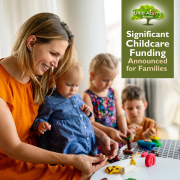
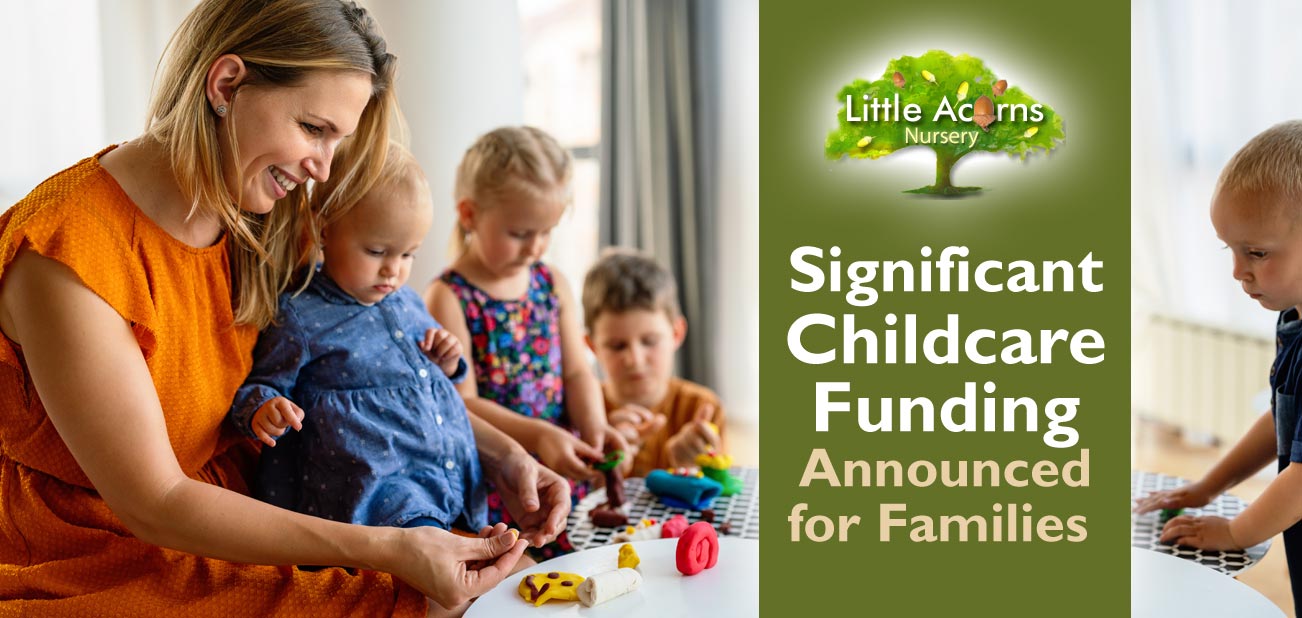
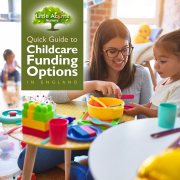
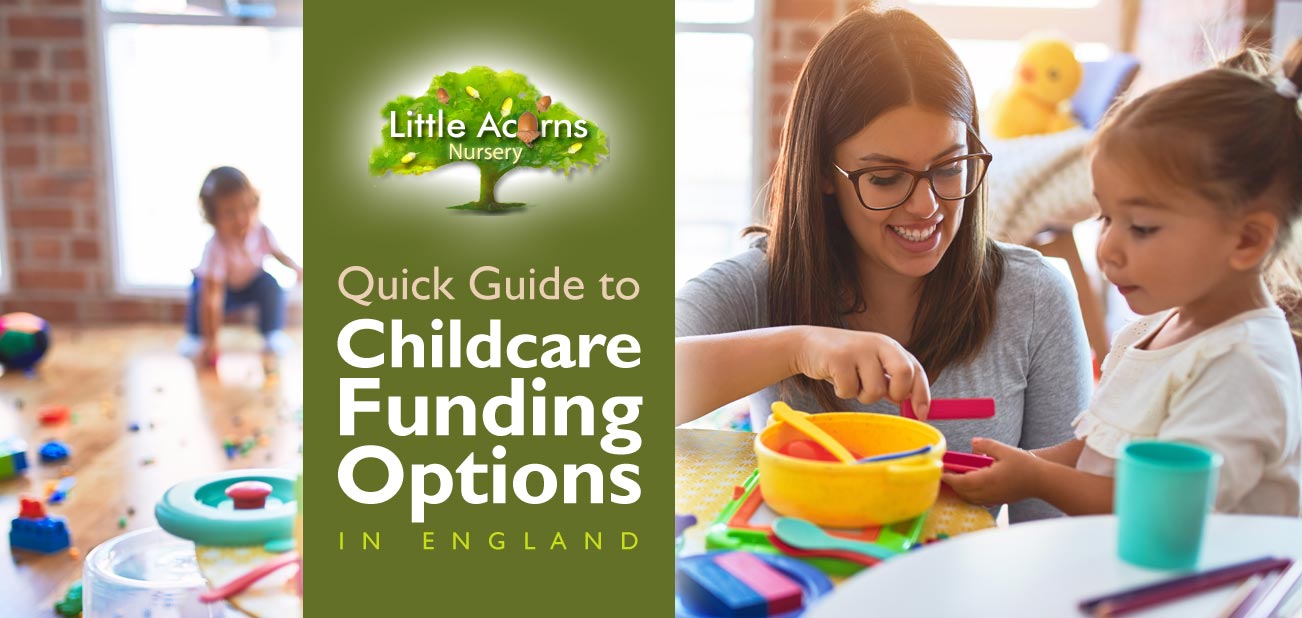
 One of the first challenges when considering childcare for your little one is how to fund it. If you’re an affluent family, then great. However, if childcare costs will be a more significant hurdle to overcome, the good news is that there are lots of options available. Either way, it will help to be well-informed about the various childcare funding schemes on offer from the Government. There are quite a few of them and some are extremely generous and surprisingly easy to obtain. Today’s Quick Guide to Childcare Funding Options in England will give you an at-a-glance overview of what’s available, the key eligibility criteria and how to apply. Note, though, that they generally fund in-person childcare only from approved providers (like Little Acorns). Take a look at the many options …
One of the first challenges when considering childcare for your little one is how to fund it. If you’re an affluent family, then great. However, if childcare costs will be a more significant hurdle to overcome, the good news is that there are lots of options available. Either way, it will help to be well-informed about the various childcare funding schemes on offer from the Government. There are quite a few of them and some are extremely generous and surprisingly easy to obtain. Today’s Quick Guide to Childcare Funding Options in England will give you an at-a-glance overview of what’s available, the key eligibility criteria and how to apply. Note, though, that they generally fund in-person childcare only from approved providers (like Little Acorns). Take a look at the many options … You’ve no doubt heard of, or read about, childcare ‘vouchers’. They sound great, but what are they and how do you get them?
You’ve no doubt heard of, or read about, childcare ‘vouchers’. They sound great, but what are they and how do you get them? Tax-Free Childcare is a great scheme which, in contrast to childcare vouchers, is widely available to working families — even for those with relatively high earnings.
Tax-Free Childcare is a great scheme which, in contrast to childcare vouchers, is widely available to working families — even for those with relatively high earnings. Certain 2-year-olds are eligible for 15 hours of free childcare each week, through another Government scheme. This one is to help primarily those families on benefits.
Certain 2-year-olds are eligible for 15 hours of free childcare each week, through another Government scheme. This one is to help primarily those families on benefits. 3 and 4-year-olds in England are very well catered for when it comes to free childcare funding. This is aimed to help them receive that all-important early years education and to help those parents wishing to return to the workplace.
3 and 4-year-olds in England are very well catered for when it comes to free childcare funding. This is aimed to help them receive that all-important early years education and to help those parents wishing to return to the workplace. Tax Credits specifically for childcare are only available to existing claimants under the scheme, through ‘Working Tax Credits’. New claimants should instead refer to the ‘Childcare Funding through Universal Credit’ section below.
Tax Credits specifically for childcare are only available to existing claimants under the scheme, through ‘Working Tax Credits’. New claimants should instead refer to the ‘Childcare Funding through Universal Credit’ section below. For those who are eligible, this is quite a generous scheme that allows them to reclaim* as much as 85% of their childcare costs. The maximum available, however, is £646.35* each month for one child, or it’s £1108.04* for more than one.
For those who are eligible, this is quite a generous scheme that allows them to reclaim* as much as 85% of their childcare costs. The maximum available, however, is £646.35* each month for one child, or it’s £1108.04* for more than one. This is a grant that does not need to be repaid and is in addition to any undergraduate Student Finance.
This is a grant that does not need to be repaid and is in addition to any undergraduate Student Finance. Learner Support is a type of financial support designed for students who are suffering financial hardship. It can be used to fund childcare for eligible students who are also parents.
Learner Support is a type of financial support designed for students who are suffering financial hardship. It can be used to fund childcare for eligible students who are also parents. Care to Learn may suit if you are a parent who is not yet 20 and are studying on a publicly-funded course, although see caveats below.
Care to Learn may suit if you are a parent who is not yet 20 and are studying on a publicly-funded course, although see caveats below.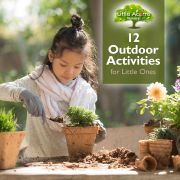
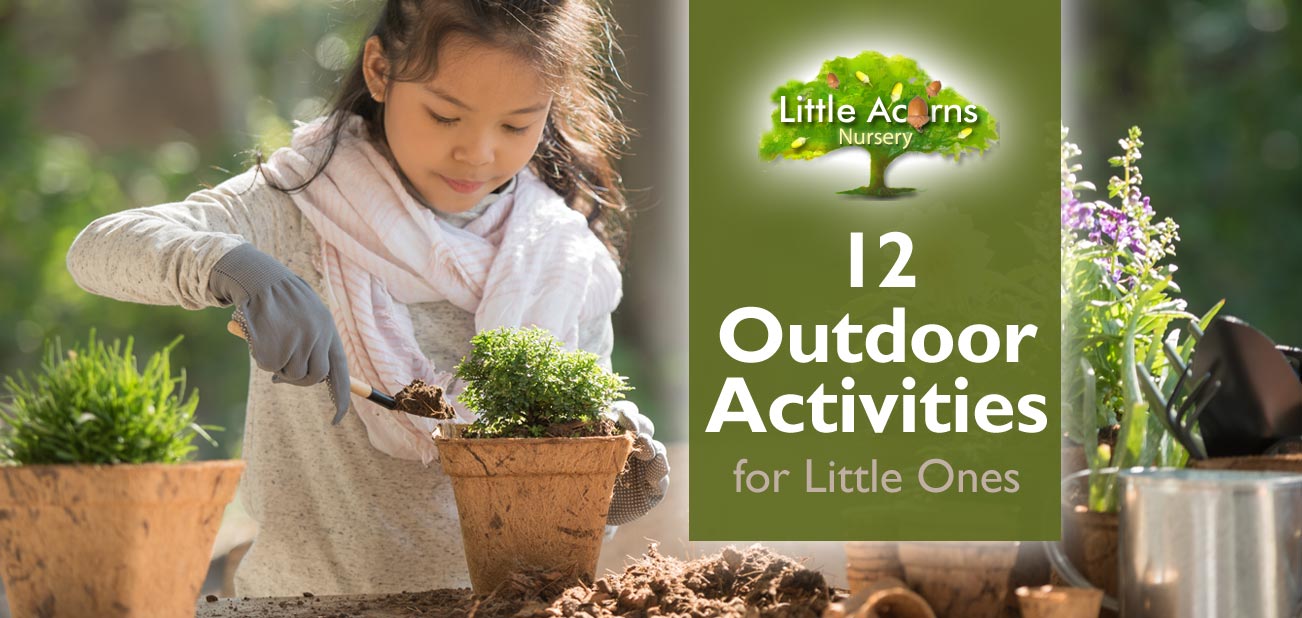
 1. Bird spotting
1. Bird spotting ee & Butterfly Spotting
ee & Butterfly Spotting 3. Search for Animal Tracks
3. Search for Animal Tracks 4. Make a Den
4. Make a Den 5. Float a Boat
5. Float a Boat 6. Go on a Ramble
6. Go on a Ramble 7. Get into Photography
7. Get into Photography 8. Obstacle Course
8. Obstacle Course 9. Have a Picnic
9. Have a Picnic
 11. Hunt for Mini Beasts
11. Hunt for Mini Beasts 12. Get Creative with Rocks & Stones
12. Get Creative with Rocks & Stones Whether on the beach or in the garden, it’s surprising how creative children can be with stones and rocks! Stones can be painted with lovely patterns or images, perhaps combined with simple words or as part of a ‘stone story’. Bigger rocks can be piled one on top of the other to form sculptures — these look magical. Children will love these and other creative activities that they can take part in outdoors, with simple stones and rocks.
Whether on the beach or in the garden, it’s surprising how creative children can be with stones and rocks! Stones can be painted with lovely patterns or images, perhaps combined with simple words or as part of a ‘stone story’. Bigger rocks can be piled one on top of the other to form sculptures — these look magical. Children will love these and other creative activities that they can take part in outdoors, with simple stones and rocks.